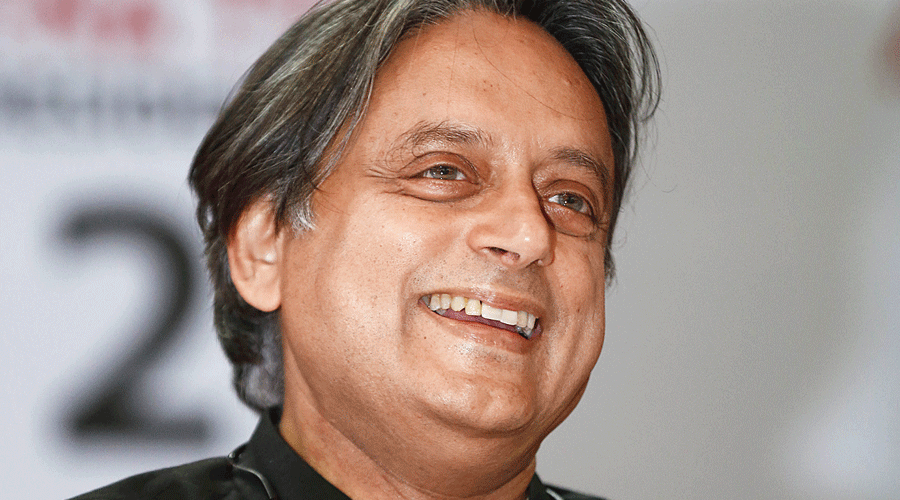Shashi Tharoor’s suggestion that India switch to a presidential form of governance as parliamentary democracy has failed the country has been firmly rejected by Congress leaders who have questioned the sagacity and timing of his proposition.
Tharoor, the MP of Thiruvanathapuram in Kerala and the president of the Congress’s professional cell, has written an article in The Indian Express newspaper where he has proposed a transformation to the presidential form of governance as a solution to the “shameful conduct” of politicians as reflected in defections and toppling of governments.
The flamboyant leader has also said parliamentary democracy has created a breed of legislators largely unqualified to legislate and willing to shift loyalty out of selfish interests.
While no Congress leader The Telegraph spoke to supported the idea of discarding parliamentary democracy, the majority of them differed with Tharoor on the basic construct — that the degeneration in political culture had been caused by a faulty system of governance. The leaders asserted that various socio-political factors were responsible for the unwanted disturbances. All of them rejected the understanding that only educated people were committed to progressive legislation.
The general belief in the Congress is that parliamentary democracy is a guard against autocratic rule. Leaders felt that floating such an idea was playing into the hands of Prime Minister Narendra Modi.
There is a perception that the Modi government prefers a presidential system. In November 2018, such a line of thought had found reflection in a concept note for a proposed museum of Prime Ministers. “It is often said that India has evolved into an almost Presidential-style parliamentary democracy,” the note had said, asserting that this was quite different in other countries following the Westminster model.
Many Congress veterans recalled that the idea of a presidential form of governance had been floated earlier too but never given a serious thought in the party.
B.K. Nehru, diplomat and Jawaharlal Nehru’s nephew, had proposed a presidential form of governance at the peak of Indira Gandhi’s popularity in 1974. Leaders like A.R. Antulay and Vasanth Sathe had been the most vocal champions of the proposal.
However, Indira had herself rejected the idea in 1976 although she was indisputably the most popular leader in the country.
While most other leaders, though shocked by Tharoor’s prognosis, avoided speaking on record as they felt that triggering “a bogus debate” at a time when constitutionalism was in grave peril would not be pragmatic, Congress communications chief Randeep Surjewala articulated the party’s position in a conversation with this newspaper.
“It is his personal opinion. The Congress believes in, only in, parliamentary democracy. Mahatma Gandhi, Jawaharalal Nehru, B.R. Ambedkar, Sardar Patel and other stalwarts of the freedom movement had chosen this system after much deliberation,” Surjewala said.
The Congress spokesman explained: “In a vast country with such cultural, religious and linguistic diversities, parliamentary democracy has not only ensured representation of all shades of opinion, every region and every section of society, it has also proved to be the most powerful unifying factor in the country.
“Parliamentary democracy is the guaranteed anathema to autocratic rule, an assurance that one man’s view cannot be imposed on 130 crore people. It is also a guarantee against majoritarianism.”
But the party’s chief spokesperson took care not to attack his colleague by adding: “It is also the beauty of the Congress that diverse opinions and debate on multiple issues by persons of eminence and intellect like Tharoor are allowed and welcomed.”
Many other leaders known for their intellectual prowess were, however, not so kind. A former Union minister said: “This is walking straight into Modi’s trap. This is aiding the destruction of democracy in India. One could ignore these ideas in normal circumstances but proposing this at a time when democracy is passing through its worst phase is stupid.”
Another Congress leader said: “It is crazy to link defections to failure of parliamentary democracy. Is Tharoor seeing a deliberate subversion of the people’s mandate by using coercive tactics and money power as a systemic failure? Is he describing a crime as infirmities of the system?
“What happened in Karnataka and Madhya Pradesh only proved that Modi is not interested in parliamentary democracy and a multi-party system. Rajasthan is no different. In the existing system, you have to buy lots of MLAs. In a presidential system, one man’s betrayal will ruin everything.”
Most Congress leaders insisted that the need of the hour is to protect constitutional democracy, not to alter the system of governance. They believe there is no point in discussing the styling of the house when the foundation has become weak and is crying for attention.
“We in the Congress need to think about the restoration of normal politics first; of securing the constitutional guarantees of equality and justice and fairness in elections. The fundamentals that sustained India for seven decades are under threat. We need to protect it first,” a Congress veteran who has seen politics closely for the past five decades observed.










